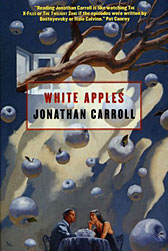News
Books
Writing
Hobbies
Gallery
Links
Email Brian
Email Kerri
Unless otherwise noted,
all material on Heromaker.net
is written by Brian Murphy
© 2006.
Review Archive
BOOKS
 White Apples
White Applesby Jonathan Carroll
Tor Books; New York, NY; 304 pages; Hardcover; $24.95
I came upon Jonathan Carroll's works a few years ago when I was working at Sovereign Media and I received a free copy of Kissing the Beehive. A year or two after that, I read A Marriage of Sticks. And I loved them both. Carroll has a way of setting up a story that feels familiar and easy but then takes the reader to places unexpected. This, for the most part, is a good thing. If you're not one who goes in for surprises, than Carroll might not be your cup of tea.
Warning: Spoilers ahead.
White Apples is about Vincent Ettrich. Vincent is dead, but he doesn't remember dying. Before he died, he left his wife for a woman named Isabelle. Isabelle is pregnant and has conversations with her unborn child, Anjo. Anjo is quite powerful—or rather, will be, once it's born and becomes a savior-like person for humanity. Coco is a woman-shaped entity who comes into this world to help Vincent and Isabelle understand a little bit more about life and death and time and their roles in the REALLY grand scheme of things; she has to, because this time around Chaos has become self-aware, and it's looking to cause some major damage.
A little more than halfway through White Apples we find Carroll's main philosophical/religious contention that is "death as a mosaic." (Whether this is Carroll's actual belief or not is irrelevant; it's what his characters believe and that's good enough for me as a reader.) I'm not sure if I'd do it justice to try and explain the thesis, but it goes something like this: There is no heaven and hell, just life and death and purgatory. Purgatory is where you learn about your life and where you learn how to be dead. Being dead involves understanding your life—how you arranged it, how you learned from it, how it was beautiful and how it was important. In death, you're entire life is like a single tile in a really big mosaic. It's colorful and important to the whole picture. Removed it and the whole image suffers. Put everyone's (and Carroll does mean EVERYONE—animals, aliens, plants, etc.) little tiles in the correct pattern and you get a complete image of God. When the image is complete, God shatters himself again, sends out the little pieces of himself into the universe where they change and grow and learn and become something else. Upon their return they're quite different and the overall picture is different, too. But every piece is important and beautiful and has meaning.
I like this theory. I like it a lot, in fact. It allows for everyone, no matter how big or small, to be important and it also takes into account that everything that everyone does has meaning and will have repercussions. Sometimes the world in which we live (which we've created) tries to tell us we're not important or unique, and to be honest, sometimes it's easy to believe this. (Like in the film Fight Club: "You are NOT a unique snowflake!) But then you read a book like White Apples you might crook your head to one side and realize that—although you're not solving world hunger, or discovering the cure for cancer, or building a better breakfast donut—whatever you do is important because you're doing it.
If you're into this sort of philosophical personal exploration, by all means, pick up White Apples. If you want to read a book that, five pages from the end you still have no idea how it will end, by all means, pick up White Apples. If you want to read two of the coolest scenes you'll ever read in your life (hint: one is at the zoo and the other is right after Vincent bites someone's neck) then, by all means, pick up White Apples.
The cover blurb says, "Reading Jonathan Carroll is like watching The X-Files or The Twilight Zone if the episodes were written by Dostoyevksy or Italo Calvino." That's better than I ever could put it.
I may be considered a hack for pointing to another reviewer's review of White Apples within my own review—but Paul Di Filippo has such a way with words, I'd feel remiss if I didn't point you to his review of White Apples over at Science Fiction Weekly.
|
|
